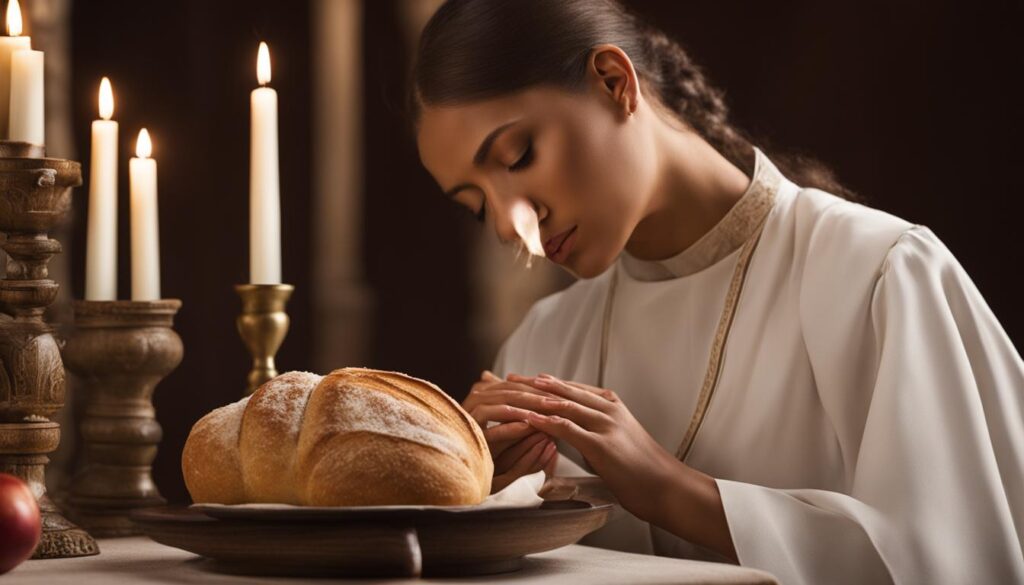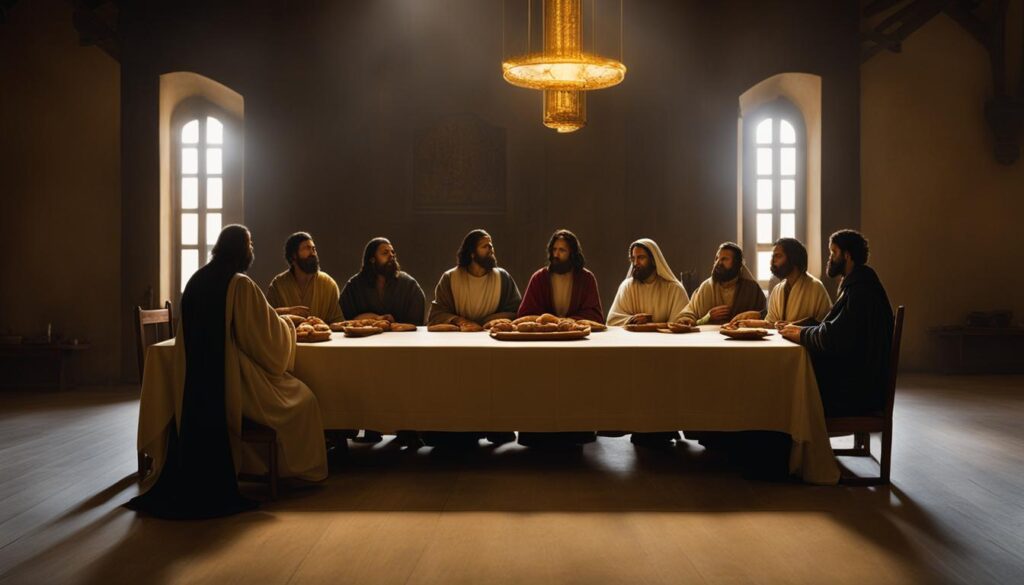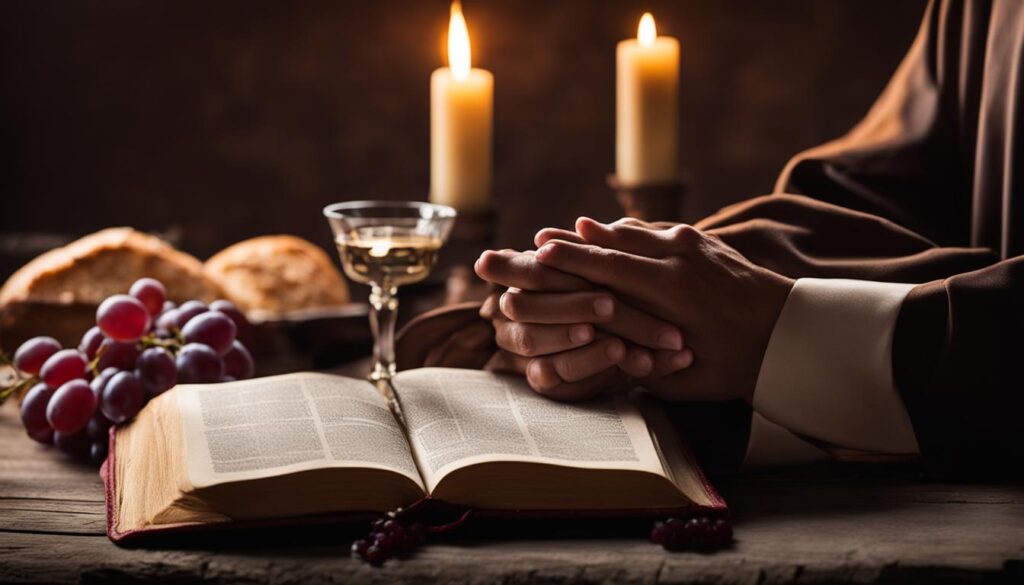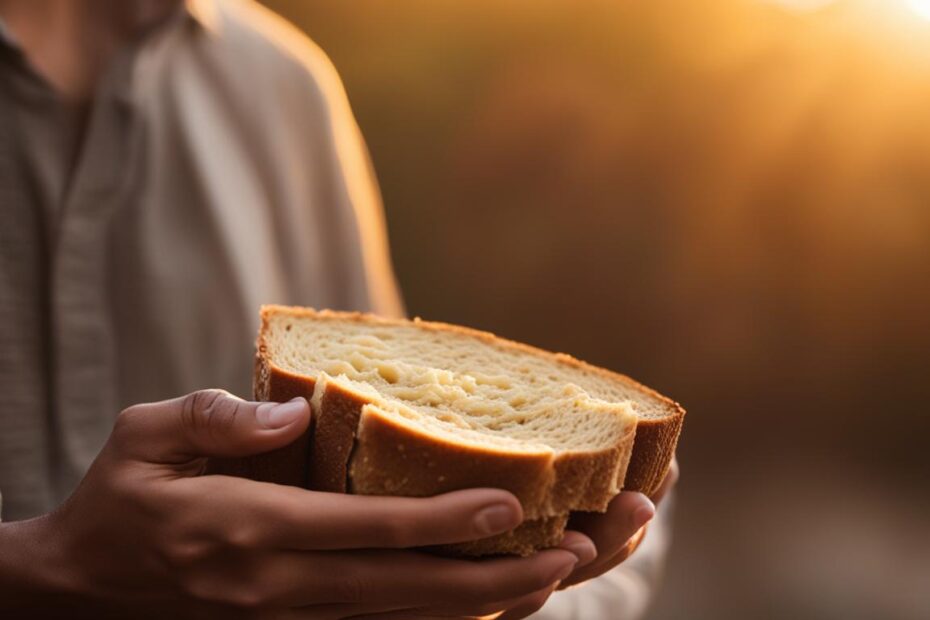Communion is a sacred practice for Christians that involves partaking of bread and wine as a remembrance of Jesus’ sacrifice on the cross. It is important to approach communion with reverence and understanding, including knowing the appropriate prayers to say. In this guide, we will explore various prayers for communion, including prayers for before and after communion, as well as prayers for receiving and taking communion.
Key Takeaways:
- Knowing the appropriate prayers for communion can enhance your experience and connection with God.
- Communion is a time to remember and give thanks for Jesus’ sacrifice.
- Prayers before and after communion can help you prepare your heart and express gratitude.
- Seeking communion blessings through prayer can open you up to spiritual transformation.
- Communion is not just a ritual but a time to commune with God and seek a deeper connection.
Understanding Communion: The Significance of the Last Supper
The practice of communion, also known as the Eucharist or the Lord’s Supper, originates from the Last Supper Jesus had with his disciples before his crucifixion. During this meal, Jesus took bread and wine, giving them new significance as representations of his body and blood. Communion serves as a commemoration of the sacrifice Jesus made for humanity’s salvation, a time to remember and give thanks for his grace and love.
At the Last Supper, Jesus shared the bread, saying, “This is my body given for you; do this in remembrance of me.” He also shared the cup of wine, stating, “This cup is the new covenant in my blood, which is poured out for you.” These words from Jesus established the foundation of the sacrament of communion, where believers partake of bread and wine to remember and honor his sacrifice.
The Last Supper marks a pivotal moment in Christian history, as it symbolizes the inauguration of the new covenant and the central act of Jesus’ redemptive mission. By understanding the significance of the Last Supper, believers can approach communion with a deep sense of gratitude and reverence, recognizing the love and grace extended to them through Jesus’ sacrifice.
Table: Comparing the Last Supper and Communion
| Last Supper | Communion | |
|---|---|---|
| Origin | Jesus’ final meal with his disciples | Established by Jesus as a sacrament |
| Elements | Bread and wine | Bread and wine |
| Significance | Symbolizes Jesus’ impending sacrifice | Commemorates Jesus’ sacrifice and the new covenant |
| Purpose | Preparation for Jesus’ crucifixion | Remembering and honoring Jesus’ sacrifice |
| Meaning | Anticipation | Remembrance and gratitude |
In conclusion, understanding the significance of the Last Supper provides a deeper appreciation for the practice of communion. By partaking in bread and wine, believers not only remember Jesus’ sacrifice but also enter into a sacred communion with him and their fellow believers. Through communion, they express their faith, gratitude, and commitment to follow Jesus’ example of sacrificial love.
The Lord’s Supper Prayer: Approaching Communion with Intention
Approaching the Lord’s Supper with intention is crucial for believers as it allows for a deeper connection with God and a more meaningful communion experience. The Lord’s Supper prayer serves as a guide to prepare the heart and mind for communion, creating an atmosphere of reverence and gratitude. By offering a prayer before partaking in communion, believers can intentionally focus on the significance of Jesus’ sacrifice and align their intentions with God’s purpose.
This intentional approach to communion involves self-examination, repentance, and rejoicing in the redemption and forgiveness that Jesus’ sacrifice offers. It is a time to reflect on one’s relationship with God, confess any sins or shortcomings, and truly appreciate the gift of salvation. The Lord’s Supper prayer helps believers enter into communion with a humble and grateful spirit, ready to honor and commune with God.
“As we gather around this table, Lord, we come with hearts full of gratitude and reverence. We thank you for the sacrifice of Jesus, who gave His body and blood for our salvation. Help us to approach this communion with sincere hearts, examining ourselves and repenting of any sins. May this sacred act strengthen our faith, deepen our connection with You, and transform us to reflect Your love to the world. In Jesus’ name, we pray. Amen.”
The Significance of Intention in Communion
The intention behind participating in the Lord’s Supper goes beyond mere ritual or tradition. It is an opportunity to intimately connect with God and experience His presence. Approaching communion with intention allows believers to fully appreciate the significance of Jesus’ sacrifice and the grace extended to them. It also emphasizes the purpose of communion in fostering spiritual growth and unity within the body of Christ.
By intentionally engaging in the Lord’s Supper prayer, believers open themselves to the transformative power of communion. They invite God to work in their hearts, renew their faith, and empower them to live in accordance with His will. Intentional communion leads to a deeper understanding and experience of God’s love and grace, enabling believers to live out their faith more authentically in their daily lives.
The Lord’s Supper Prayer: Approaching Communion with Intention
| Benefits of Approaching Communion with Intention | Ways to Cultivate Intention in Communion |
|---|---|
|
|
Approaching the Lord’s Supper with intention elevates the communion experience from a mere religious observance to a sacred and transformative encounter with God. Through intentional prayers, self-reflection, and a focus on Jesus’ sacrifice, believers can fully embrace the blessings and significance of communion, drawing closer to God and growing in their faith.

Communion Prayers: Praying for Holy Communion
Before partaking in the sacred act of communion, it is customary for believers to offer prayers that reflect the significance of this moment and express gratitude for Jesus’ sacrifice. These communion prayers help set the tone and prepare the heart for receiving the body and blood of Christ. Whether said silently or aloud, these prayers create a sacred space for believers to connect deeply with God and acknowledge the transformative power of communion.
Below are some examples of prayers for Holy Communion:
- Prayer before Communion: “Dear Heavenly Father, as I approach this holy moment of communion, I humbly come before You. Thank You for the gift of Your Son, Jesus Christ, who gave His body and blood for my salvation. I repent of my sins and ask for Your forgiveness. As I partake in this sacred act, may I be filled with Your presence and experience the depth of Your love. In Jesus’ name, I pray. Amen.”
- Prayer after Communion: “Gracious God, I thank You for the privilege of partaking in communion today. As I reflect on the sacrifice of Jesus, I am reminded of Your boundless grace and mercy. Renew my spirit and strengthen my faith as I go forth from this moment. May the power of communion stay with me, guiding my actions and thoughts. In Your holy name, I pray. Amen.”
These prayers for Holy Communion enable believers to approach the table with reverence, gratitude, and a renewed commitment to live according to Christ’s teachings. They serve as a reminder of the sacredness of communion and provide an opportunity to seek forgiveness, receive spiritual nourishment, and express profound gratitude for God’s love and sacrifice.
Table: Prayers for Holy Communion
| Prayer for Communion | Intention | Key Themes |
|---|---|---|
| Prayer before Communion | To approach the table with humility, repentance, and reverence. | Gratitude, forgiveness, salvation. |
| Prayer after Communion | To express thanks for the spiritual nourishment received and seek guidance for living a worthy life. | Renewal, grace, guidance. |
“As I partake in this sacred act, may I be filled with Your presence and experience the depth of Your love.”
These prayers encompass the core elements of communion, allowing believers to connect deeply with God and experience His presence during this holy sacrament. Through these prayers, believers seek forgiveness, express gratitude, and invite the transformative power of communion into their lives. As they approach the table with intention and reverence, these prayers serve as a powerful reminder of the love and sacrifice of Jesus and the grace that is bestowed upon believers through communion.
Prayer for Receiving Communion: Seeking Communion Blessings
When partaking in the sacred act of communion, it is important to approach it with reverence and a humble heart. Offering a prayer specifically focused on receiving communion can help believers seek the blessings that come with this transformative experience. By expressing gratitude and acknowledging the sanctity of the moment, we open ourselves to a deeper connection with God and the spiritual blessings that communion brings.
The prayer for receiving communion can be a personal reflection or a set prayer that aligns with one’s faith and beliefs. It can include expressions of gratitude for Jesus’ sacrifice, a humble confession of sins, and a plea for God’s grace and guidance. Through this prayer, we invite the Holy Spirit to dwell within us, cleanse our hearts, and prepare us to fully receive the spiritual nourishment that communion provides.
“Dear Lord, as I approach the communion table, I humbly seek your presence and blessings. Thank you for the sacrifice of your Son, Jesus Christ, whose body was broken and blood shed for my redemption. I confess my sins and ask for your forgiveness. Please cleanse my heart and make me worthy to partake in this holy sacrament. Fill me with your Spirit and strengthen my faith. May this communion be a moment of profound connection with you, where I experience your love, grace, and guidance. In Jesus’ name, Amen.”
Table: Reflection Quotes on Communion Blessings
| Quote | Author |
|---|---|
| “The blessings of communion are not limited to the moment; they extend to the transformation of our hearts and the strengthening of our spiritual journey.” | Unknown |
| “Through communion, we seek not only to receive blessings but to become a blessing to others, carrying the love and grace of Jesus into the world.” | Unknown |
| “Communion blessings are not earned but freely given by a loving God who desires to meet us where we are and shower us with His grace.” | Unknown |
Reflecting on the quotes above, we are reminded that the blessings of communion go beyond the physical act of partaking in bread and wine. They encompass the transformation of our hearts, the sharing of God’s love with others, and the unmerited grace bestowed upon us. As we offer a prayer for receiving communion, let us open our hearts to receive these blessings and carry them into our daily lives.
Prayer for Taking Communion: A Prayer of Remembrance and Celebration
When partaking in communion, it is important to approach the sacred act with a heart full of gratitude and joy. The prayer for taking communion serves as a beautiful expression of remembrance and celebration of Jesus’ sacrifice. It is a moment to reflect on the significance of his body and blood, and to honor his love and redemption.
As we come to the table, let us offer this prayer:
Dear Lord, as we gather around this table, we remember the sacrifice you made for us on the cross. We partake of this bread and wine with grateful hearts, knowing that they represent your body and blood. We celebrate your love and the redemption you offer us through your sacrifice. Thank you for the forgiveness of sins and the eternal life we have through you. Help us to live in remembrance of your grace and to share your love with others. In your precious name, Amen.
By offering this prayer before taking communion, we invite the presence of the Holy Spirit into our hearts and minds. It is a moment of surrender and communion with God, where we seek to draw closer to Him and experience His transformative power.
Reflecting on the Prayer for Taking Communion
The prayer for taking communion encapsulates the essence of this sacred practice. It combines remembrance of Jesus’ sacrificial love with a celebration of His redemption and grace. Through this prayer, we acknowledge our dependence on Him and express our gratitude for the forgiveness of sins and the eternal life we have through Him.
As we approach the table, let us remember the significance of taking communion. It is not a mere ritual, but a powerful act of worship and spiritual communion. By offering this prayer, we open our hearts to the transformative work of the Holy Spirit and invite Him to deepen our understanding and experience of God’s love.
The Prayer for Taking Communion in Practice
When preparing to take communion, it is helpful to spend a few moments in prayer, reflecting on our need for redemption and the immense love of Jesus. The prayer for taking communion can be tailored to personal preferences and expressions of faith, but its core elements of remembrance and celebration should remain. During the prayer, we can also express our desire to live in remembrance of Jesus’ sacrifice and to share His love with others.
As we engage in this prayer for taking communion, let us remember that it is not just about the words we speak, but the attitude of our hearts. May our prayers be sincere and our spirits be open to the presence of the Holy Spirit as we partake of the bread and wine, symbolizing the body and blood of Jesus.
Praying for Communion with God: A Connection with the Divine
Communion is not just a mere ritual; it is an opportunity to seek a profound connection with God. By approaching communion with a deep desire to commune with the divine, believers can experience a spiritual encounter like no other. Praying for communion with God opens the door to an intimate dialogue with the creator, allowing individuals to experience His presence and guidance.
When we pray for communion with God during the sacrament of communion, we acknowledge our dependence on Him and our desire for His presence in our lives. It is a moment to surrender ourselves completely to His will and to seek His guidance, wisdom, and strength. Through prayer, we can open our hearts to receive His love, grace, and blessings.
During communion, we can offer prayers of gratitude, adoration, and supplication, expressing our deep longing to be in communion with God. These prayers can be personal, heartfelt, and authentic, allowing us to pour out our deepest desires, fears, and hopes before our heavenly Father. By praying for communion with God, we invite Him into our lives, inviting Him to transform and empower us to live according to His will.

As we partake in the sacred act of communion, let us remember that it is not just about the bread and wine, but about the spiritual nourishment and connection we receive by communing with God. Let us approach communion with reverence, humility, and an open heart, seeking to deepen our relationship with the divine. Through prayer, may we experience the transformative power of communion and draw closer to the heart of God.
The Power of Communion: Reflections on the Last Supper
Communion is a sacred practice that holds immense power and significance in the Christian faith. It is a time for believers to reflect on the Last Supper, where Jesus shared a meal with his disciples before his crucifixion. This momentous event serves as a powerful reminder of Jesus’ love, grace, and sacrifice.
“Take, eat; this is my body which is given for you. Do this in remembrance of me.” – Luke 22:19
As we partake in communion, we are invited to remember the profound impact of Jesus’ sacrifice and the eternal life it offers us. It is a time of deep reflection, gratitude, and spiritual connection with God and fellow believers. Through the act of taking the bread and wine, we symbolically participate in the body and blood of Christ, reminding ourselves of His ultimate sacrifice for our sins.
The Last Supper represents a moment of unity and fellowship among believers, as well as a call to live out the teachings of Jesus in our daily lives. It reminds us to love one another, to serve one another, and to share the good news of salvation with the world. Communion is a spiritual practice that transcends time and connects us to the rich history of our faith.
Table: Symbols of the Last Supper
| Symbol | Meaning |
|---|---|
| Bread | Represents the body of Christ |
| Wine | Symbolizes the blood of Christ |
| Judas’ betrayal | Highlights the sacrifice of Jesus and the forgiveness offered to all |
| Foot-washing | Symbolizes humility and service to others |
As we partake in communion and reflect on the Last Supper, let us be reminded of the love, grace, and sacrifice of Jesus. May this sacred practice deepen our faith, strengthen our relationships with God and one another, and inspire us to live lives that honor Him.

Communion in Practice: Understanding Frequency and Preparation
Communion, also known as the Lord’s Supper or the Eucharist, is a significant practice in Christian worship. While there is no specific directive in the Bible regarding the frequency of communion, it is a regular part of many church services. The frequency of communion varies among different denominations and individual churches, with some offering it weekly, monthly, or on special occasions. The decision on how often to partake in communion is often based on theological beliefs, traditions, and the desire to provide an opportunity for believers to reflect, remember, and connect with God.
Approaching communion requires proper preparation and reverence. It is important to have a repentant heart and a sincere desire to commune with God. Before participating in communion, believers are encouraged to examine themselves, confess any known sins, and reconcile with others if needed. This self-reflection and confession help to create an atmosphere of humility, reverence, and gratitude for the forgiveness and grace offered through Jesus’ sacrifice. By preparing our hearts and minds, we can fully engage in the communion experience and receive the spiritual nourishment it offers.

Table: Comparison of Communion Practices
| Church | Frequency of Communion | Preparation |
|---|---|---|
| Denomination A | Weekly | Prayer, confession, and examination of conscience |
| Denomination B | Monthly | Corporate repentance and confession |
| Denomination C | Quarterly | Individual examination and confession |
It is worth noting that regardless of the frequency of communion, the emphasis should be on the spiritual significance and personal connection with God rather than the ritualistic aspects. Communion is an opportunity to remember and celebrate Jesus’ sacrifice, to seek forgiveness and reconciliation, and to experience a deeper union with God. By approaching communion with reverence, understanding its purpose, and preparing our hearts, we can fully embrace the blessings and spiritual nourishment it offers.
Living a Worthy Life: Honoring Christ Beyond Communion Sunday
Communion is not limited to a single moment or day; it is a practice that should shape our lives daily. As believers, we are called to live in a way that honors Christ, reflecting His love and sacrifice in our thoughts, words, and actions. Beyond the Sunday gathering where we partake in communion, we have the opportunity to embody the spirit of communion throughout our lives.
In living a worthy life, we strive to imitate the humility, gentleness, and patience exemplified by Jesus. We seek to love others unconditionally, just as Christ loved us. This means extending grace, forgiveness, and compassion to those around us, even in the face of challenges and conflicts. By embracing these qualities, we demonstrate the transformative power of Christ’s sacrifice and invite others to experience His love through us.
The Impact of a Worthy Life
Living a life worthy of Christ has a profound impact not only on ourselves but also on those we encounter. Our actions and attitudes can speak volumes about our faith and draw others closer to God. When we honor Christ in our daily lives, we become living testimonies of His grace and truth.
“Let your light shine before others, so that they may see your good works and give glory to your Father who is in heaven.” – Matthew 5:16
By consistently living out our faith, we create opportunities to share the gospel and make a difference in the lives of those around us. Our commitment to honoring Christ beyond communion Sunday becomes a living testimony that points others to the transformative power of His love and sacrifice.
| Living a Worthy Life: Reflections | |
|---|---|
| 1 | Embrace humility and serve others selflessly. |
| 2 | Show gentleness and compassion to those in need. |
| 3 | Practice patience and extend grace in difficult situations. |
| 4 | Love unconditionally and forgive others as Christ forgave us. |
Living a life worthy of Christ goes beyond the act of taking communion. It is about embodying the values and teachings of Jesus every day, allowing His love to flow through us to impact the world around us. Let us strive to live lives that honor Christ, drawing others into a deeper understanding of His grace, and proclaiming His name through our words and actions.
Conclusion
In conclusion, communion is a sacred practice that holds great significance for Christians. It is a time to remember and celebrate Jesus’ sacrifice on the cross, and to seek a deeper connection with God. Approaching communion with reverence and understanding, believers can experience the transformative power and blessings that come with this holy act.
Throughout this guide, we have explored various aspects of communion, including prayers for before and after communion, prayers for receiving and taking communion, and the importance of the Lord’s Supper prayer. We have also discussed the power of communion as a reflection on the Last Supper and its impact on our daily lives.
As you engage in communion, may you be filled with gratitude and joy, and may your communion experience enrich your faith journey. Remember to approach communion with intention, offering prayers of remembrance, thanksgiving, and seeking communion blessings. Live a life worthy of Christ’s sacrifice, honoring Him in all that you do.
Thank you for joining us on this exploration of communion. May your communion experiences be filled with the love and grace of Jesus, and may your spiritual connection with God deepen through this sacred practice.
FAQ
What prayer should I say when taking communion?
There are various prayers you can say when taking communion, including prayers for before and after communion, prayers for receiving communion, and prayers for taking communion. These prayers can help you approach communion with reverence and gratitude.
What is the significance of the Last Supper in communion?
The Last Supper, which is the origin of the practice of communion, holds great significance in the Christian faith. It was during this meal that Jesus took bread and wine and gave them new meaning as representations of his body and blood. Communion serves as a remembrance and celebration of Jesus’ sacrifice on the cross.
How should I approach communion with intention?
Approaching communion with intention involves understanding the significance and purpose of the Lord’s Supper. It requires self-examination, repentance, and rejoicing in the redemption and forgiveness offered through Jesus’ sacrifice. It is a time to remember and honor the love and grace of Jesus.
Are there specific prayers for Holy Communion?
Yes, there are prayers specifically focused on Holy Communion. These prayers can be said before and after communion, helping believers acknowledge the significance of Jesus’ body and blood, repent of any sins, and celebrate the redemption and eternal life that Jesus’ sacrifice provides.
What is a prayer for receiving communion?
A prayer for receiving communion is a prayer that seeks the blessings that come with this sacred act. It is a prayer of gratitude and acknowledgement of the sanctity of the moment. By offering this prayer, believers can open themselves to the transformative power of communion and the blessings it brings.
Can you suggest a prayer for taking communion?
Certainly! A prayer for taking communion is a prayer that emphasizes the remembrance of Jesus’ body and blood and the celebration of his love and redemption. By offering this prayer before partaking in communion, believers can enter into the experience with a heart full of gratitude and joy.
How can I pray for communion with God?
Praying for communion with God during communion involves seeking a deeper connection with the divine. It is about approaching communion with the desire to experience a genuine and intimate connection with God. By doing so, believers can cultivate a more profound spiritual experience during communion.
What reflections can I have on the Last Supper during communion?
The Last Supper serves as a powerful reminder of the love, grace, and sacrifice of Jesus. Reflecting on the events of the Last Supper and their implications can deepen your appreciation for the transformative power and eternal impact of communion. It can help you to understand the depth of Jesus’ love and the significance of his sacrifice.
How often should I participate in communion?
The frequency of communion varies among different churches and denominations. While there is no specific directive in the Bible regarding the frequency of communion, it is a regular practice in Christian worship. It is important to understand the significance of communion and make intentional preparations to fully engage in this sacred practice.
Is communion only important during the service?
No, communion is not limited to a single moment or day. It should influence the way believers live their lives daily. Communion serves as a reminder of Jesus’ sacrifice and the love he demonstrated. It calls believers to live a worthy life, walking in humility, gentleness, patience, and love, reflecting Christ’s character and honoring Him in all aspects of life.








